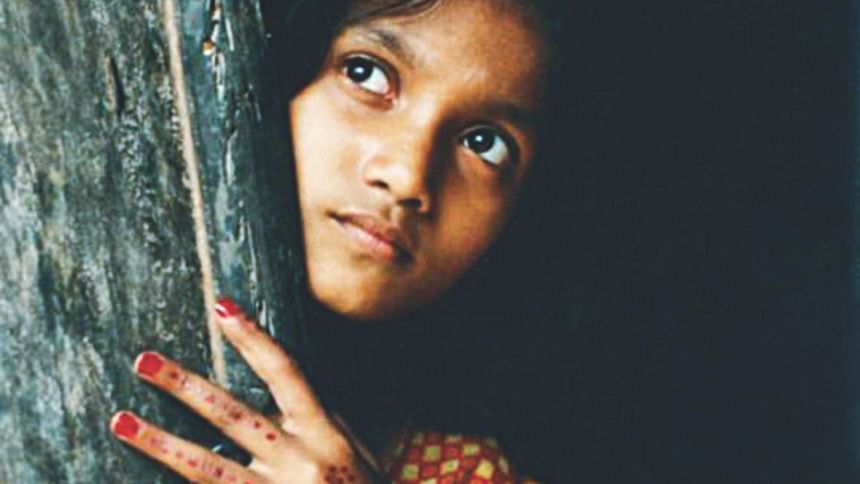Draft Rules on the Child Marriage Restraint Act 2016

Under the delusional conception of decreasing child marriages with the aid of the controversial 'exceptional clause', draft Rules have already been prepared for the implementation of the Child Marriage Restraint Act 2016 (The Daily Prothom Alo, 13 March 2017). The exceptional clause allows marrying off girls under 18 in special circumstances. The Rules attempt at spelling out such 'special circumstances' under which, with judicial and parental consent and no penalties whatsoever, child marriages have been made permissible.
Keeping the rules regarding legal translation in mind, a possible linguistic rendition for the words used therein would be such: due to involvement in romantic relationships, if the girl becomes pregnant or becomes the mother of a child, the court can consider giving permission of marrying the girl off to the other person involved or if the minor girl doesn't have any close kindred in order to maintain her, in that case too, the exception clause will come to play.
The Rules have always been taken resort to for interpreting the law or for substantiating the interpretation thereof. The draft Rules, however, have created room for further interpretation of themselves. 'Romantic relationships' (even though it cannot be taken to be the exact translation of the words appearing in Bangla in the Rules) is subject to further substantiation. Whether or not such words can get a place in a piece of legislation, as Hon'ble Justice Krishna Debnath has opined recently, is an uncomfortably different discourse.
However, without precision and specificity, based on an alleged 'liaison' or 'romantic relationship' followed by the girl's pregnancy, marrying off a minor girl will give birth to unimaginably dreadful consequences. Such a wide expression thus can bring non-consensual and coercive sexual relationships within its purview too. Considering the abstraction and psycho-physiological nature of human relations and the inherent intricacies associated with non-consensual sex and/or rape, the use of such a wide, vague terminology, is questionable.
Keeping the extra-legal discourse aside, legally speaking, the draft Rules do not comply with the international standard as well. Bangladesh has ratified the United Nations Convention on the Rights of the Child. In accordance with Article 6.2 of the Convention, states are obliged to ensure the survival and development of the child to the maximum extent possible. Moreover, Article 24 stresses upon issues like diminishing child mortality and post-natal death rate.
Marrying off a child under the age of 18, for however compelling the reasons might be, is detrimental to the development of the child. As far the survival of a child is concerned, the same will be put at risk by realising the exceptional clause. Maternal mortality rate in our country has declined reportedly over the last few decades. Now we can only helplessly wait for the same to rise up.
The Act along with the draft Rules advocate in favour of preserving the best interest of the child concerned. And in furtherance of protecting that, obtaining parental and judicial consent is necessary. There is no provision for obtaining the consent of the child concerned. Article 12 of the Convention goes on to say that states are under an obligation to assure to the child, who is capable of forming own views, the right to express those views freely in all matters affecting the child. In the present case, one of the most significant decisions of one's life is legally supposed to be taken by the parents and the court.
One might argue that judicial consent includes listening to the views and opinions of the child concerned. However, in the absence of any express requirement as such, the aforementioned argument will be of little persuasive value. Another clarification of 'special circumstances' under the draft Rules is the absence of close relations of a minor.
On one hand, the country is trying to keep pace with the world in terms of empowering women and making them economically solvent. On the other hand the same country is paving ways for getting the girls dependent on others at any age, from zero to seventeen.
The Constitution portrays Bangladesh as a developmental welfare state. The ever-present struggle for thriving as a welfare state does not only appear in the Constitution as any stale or flowery epithet. That being said, whether a welfare state or one that is trying or striving to be one, can shift its liability of maintaining a kinless child, is subject to critical perusal.
Article 19 of the Convention urges the states to take all appropriate legislative, administrative, social and educational measures to protect the child from all forms of physical or mental violence. Being oblivious of the facts related to the high rate of domestic violence, the law already created rooms for exploitation of the under-aged girls. And the Rules have only added more to it. Working relentlessly for a socioeconomic reconstruction and for controlling social evils are two major aspects of a welfare state. And our legislature is only moving backward in the wrong direction.
Bangladesh was one of the handful of member states signing the UNCRC on the first day and she is the South Asian poster child for its high rank in a number of socioeconomic and gender indicators. Ironical, isn't it?
The writer is a student of Law, University of Dhaka.

 For all latest news, follow The Daily Star's Google News channel.
For all latest news, follow The Daily Star's Google News channel. 



Comments